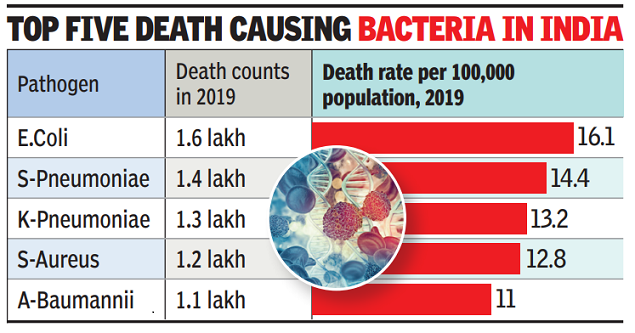- Industry
- 2 min read
5 bacteria types claimed 6.8 lakh lives in India in 2019: Report
E.coli, S.pneumoniae, K.pneumoniae, S.aureus and A.baumanii — have been found to be the deadliest pathogens in India. According to a report published in The Lancet, infections caused by the five bacteria together claimed more than 6.8 lakh lives in India in 2019.
While E Coli, which is associated with diarrhoea, urinary tract infections and pneumonia among others, claimed maximum 1.6 lakh lives in the country, S.pneumoniae, K.pneumoniae, S.aureus and A.baumannii claimed 1.4 lakh, 1.3 lakh, 1.2 lakh and 1.1 lakh deaths respectively.
The Lancet report is based on deaths attributable to bacterial infections among 33 species, including the five mentioned above. In total, the report shows, 13.7 people died due to bacterial infections in India in 2019. The other common bacteria responsible for infection-related deaths included Salmonella Typhi, non-typhoidal Salmonella and Pseudomonas aeruginosa among others.
These bacteria were associated with infection-related deaths reported from other countries as well. The Lancet report shows an estimated 1.3 crore people died due to infections globally. Of these deaths, 77 lakh deaths were associated with the 33 bacterial pathogens included in the study, with five bacteria alone connected to more than half of all deaths. More than 75% of the 77 lakh bacterial deaths occurred because of three syndromes: lower respiratory infections (LRI), bloodstream infections (BSI), and peritoneal and intra-abdominal infections (IAA), the study showed.

The pathogens associated with the most deaths differed by age. With the 940,000 deaths, S. aureus was associated with the most deaths in adults aged over 15 years globally. The most deaths in children aged 5 to 14 years were associated with Salmonella enterica serovar Typhi, with 49,000 deaths, the Lancet report shows. It adds that in children older than newborns but under 5 years of age, S. pneumoniae was the deadliest pathogen, accounting for 225,000 deaths. The pathogen associated with the most neonatal deaths was K. pneumoniae, with 124,000 deaths, the study adds.
Dr Sumit Ray, who heads critical care at St Stephen’s hospital, said nearly 20-25% of infection-related deaths involve pathogens that are resistant to most of the available drugs. Recently, Apollo hospitals introduced an antimicrobial stewardship programme to improve antimicrobial use and patient outcomes. Dr Sangita Reddy, joint managing director, Apollo, said antibiotic resistance is one of the major health threats facing the world currently. “We need to tackle it effectively,” she said.



COMMENTS
All Comments
By commenting, you agree to the Prohibited Content Policy
PostBy commenting, you agree to the Prohibited Content Policy
PostFind this Comment Offensive?
Choose your reason below and click on the submit button. This will alert our moderators to take actions